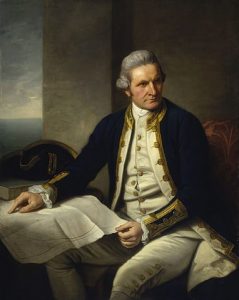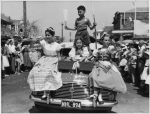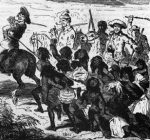
Today we introduce a new category for OpenSTEM® Blog articles: “This Week in Australian History”. So many important dates in Australian history seem to become forgotten over time that there seems to be a need to highlight some of these from time to time. For teachers of students from Foundation/Prep/Kindy to Year 6 looking for material to engage students around Australian history we recommend the OpenSTEM® Understanding Our World® HASS + Science program, which is filled with curriculum-aligned topics specifically designed to capture the interest of students. Whether you use our program or not, one can still connect with students by finding content applicable to their current lives which aligns with curriculum requirements. Here are some suggestions for this week:
 6th June: This year Wednesday 6 June was marked by the opening match of the annual State of Origin rugby league series between the NSW Blues and the Qld Maroons. Whilst rugby league has its own fascinating history, closely allied to Australia’s colonial history, and the first match between Qld and NSW was played on 11 July, 1908, the date of 6th June has another significant historical association for both states. It was on 6th June, 1859, that Queensland became a colony of Britain, separate from New South Wales. Officially referred to as “Queensland Day”, this date was celebrated with parades and festivals all over the state at its centenary in 1959. I’m sure many Queenslanders would like there to be more widespread recognition of their state’s “birthday”. Students in Years 5 and 6, in particular, with their focus on colonial and Federation history, might enjoy looking into the birthday of their own state, and the OpenSTEM resources on the history of each state can be used to good effect, see here for links: New South Wales, Victoria, Western Australia, South Australia and Tasmania.
6th June: This year Wednesday 6 June was marked by the opening match of the annual State of Origin rugby league series between the NSW Blues and the Qld Maroons. Whilst rugby league has its own fascinating history, closely allied to Australia’s colonial history, and the first match between Qld and NSW was played on 11 July, 1908, the date of 6th June has another significant historical association for both states. It was on 6th June, 1859, that Queensland became a colony of Britain, separate from New South Wales. Officially referred to as “Queensland Day”, this date was celebrated with parades and festivals all over the state at its centenary in 1959. I’m sure many Queenslanders would like there to be more widespread recognition of their state’s “birthday”. Students in Years 5 and 6, in particular, with their focus on colonial and Federation history, might enjoy looking into the birthday of their own state, and the OpenSTEM resources on the history of each state can be used to good effect, see here for links: New South Wales, Victoria, Western Australia, South Australia and Tasmania.
 10th June: A more tragic event in Australian history is the Myall Creek Massacre, which took place on 10 June 1838 in central New South Wales. About 30 unarmed indigenous Australians were killed by a group of 12 convicts and former convicts, working as stockmen in the area. No reason was given for the massacre apart from the expansion of European settlers into the area. The incident was notable in that it actually came to trial (a rare event at the time). After the jury refused to convict “a white man for killing a black” (letter to the editor of The Australian newspaper, 1838), the Attorney-General convened a second trial for 7 of the 11 men held in custody. All 7 were found guilty and hanged. The remaining 4 men were remanded to the next court session, but after the sudden disappearance of the chief Aboriginal witness against them (who was never seen again), they were released. One of them later committed suicide. The event and trial were extremely controversial, further polarising the colonial population. Today a memorial stands on the site and an annual commemoration is held. The curriculum offers the opportunity for students in Year 5 to study massacres in Australian history in the context of colonial history.
10th June: A more tragic event in Australian history is the Myall Creek Massacre, which took place on 10 June 1838 in central New South Wales. About 30 unarmed indigenous Australians were killed by a group of 12 convicts and former convicts, working as stockmen in the area. No reason was given for the massacre apart from the expansion of European settlers into the area. The incident was notable in that it actually came to trial (a rare event at the time). After the jury refused to convict “a white man for killing a black” (letter to the editor of The Australian newspaper, 1838), the Attorney-General convened a second trial for 7 of the 11 men held in custody. All 7 were found guilty and hanged. The remaining 4 men were remanded to the next court session, but after the sudden disappearance of the chief Aboriginal witness against them (who was never seen again), they were released. One of them later committed suicide. The event and trial were extremely controversial, further polarising the colonial population. Today a memorial stands on the site and an annual commemoration is held. The curriculum offers the opportunity for students in Year 5 to study massacres in Australian history in the context of colonial history.
 11th June: On this day in 1770, Captain James Cook encountered the Great Barrier Reef off the coast of Australia. Unfortunately, Cook’s ship, The Endeavour, ran aground on the reef now named for Cook’s ship, near Cape Tribulation (which was named by Cook for this unfortunate event) at 11pm at night. This incident led to Cook and his crew spending 7 weeks ashore, near modern Cooktown, repairing their ship. As a result of this time, the word “kangaroo” entered the English language and the stage was set for Australia to later become a British colony. In 1969, 6 cannons, ballast and an anchor, tossed overboard in an attempt to get the ship off the reef, were discovered and one of the cannons is on display at the Australian National Maritime Museum in Darling Harbour, Sydney. Today, with the Great Barrier Reef under extreme threat from warming, coral bleaching, pollution and increased carbon dioxide, we would do well to remember its part in our history.
11th June: On this day in 1770, Captain James Cook encountered the Great Barrier Reef off the coast of Australia. Unfortunately, Cook’s ship, The Endeavour, ran aground on the reef now named for Cook’s ship, near Cape Tribulation (which was named by Cook for this unfortunate event) at 11pm at night. This incident led to Cook and his crew spending 7 weeks ashore, near modern Cooktown, repairing their ship. As a result of this time, the word “kangaroo” entered the English language and the stage was set for Australia to later become a British colony. In 1969, 6 cannons, ballast and an anchor, tossed overboard in an attempt to get the ship off the reef, were discovered and one of the cannons is on display at the Australian National Maritime Museum in Darling Harbour, Sydney. Today, with the Great Barrier Reef under extreme threat from warming, coral bleaching, pollution and increased carbon dioxide, we would do well to remember its part in our history.
Some events in history are pleasant and can be embraced with excitement, whilst others are more sombre. However, all contain lessons for our modern lives. Students love to discuss wide ranging topics, especially if these can be made relevant to their own lives. The OpenSTEM® Understanding Our World® HASS + Science program offers a vast range of engaging ways to help teachers gain interest in these topics from their students and to stimulate enquiry and problem-solving, as well as introducing basic research skills which will stand them in good stead for life. Why not make your classroom a vibrant hub for curious young minds by implementing our programs next term?


The activities embedded in the programs make the subjects more engaging for the students as well as the teacher.
Trent Perry, Teacher